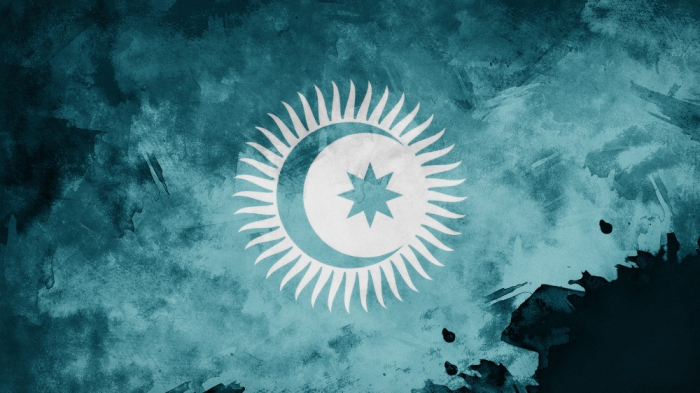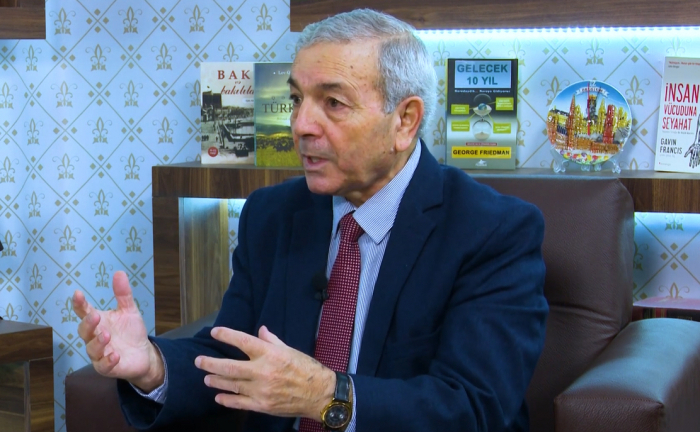‘If the Turkic civilization managed to settle and build states in an area that stretches from Asia to Europe, it speaks of its great role in Eurasia. The land and population dictate the perspective of this civilization. The Turkic states in Asia have a territory that totals over 10 million km². The European Union and Australia combined make up around 9. The comparison of these two numbers alone is a sign of prospects for development of the Turkic civilization.’
AzVision.az interviewed Professor Mais Amrahov, Doctor of History and Head of Department of Azerbaijani History at Bakikhanov History Institute at Azerbaijan National Academy of Sciences. The professor is confident that the Turkic civilization will play an exceptional role in global development.
‘The independent Turkic states emerged in 1991 as the Soviet Union collapsed. There had been numerous Turkic formations before that throughout Asia, including the Russian Federation. The future merger of autonomous formations and republics and establishment of both political and economic cooperation demonstrate the development prospects of the Turkic civilization.
As the world defines the station of the states of European Union civilization and Turkic countries in Asia, the latter turn out to have greater prospects. The states of European integration share religious and ethnographic background and their main goal is to prevent wars in Europe, whereas the prevailing values in the Turkic states are Islamic and traditional – shaping throughout millennia in the areas they have settled. They aim to both prevent warring and help other civilizations.’

- What is the global role of the Organization of Turkic States?
‘The Turkic states are organizing in a completely different direction compared to the 20th century. Back then we were more focused on the national liberation movement, separation, shaping an independent state, having independent economy and culture, whereas today we are considering political unity in a more general sense. The union of the Turkic states was not planned as a threat to any state. It serves concentrating Turkic ethnic communities around Turkic states and shaping their political culture.
In fact, we all felt the Union of Turkic States take shape in early 21st century. However, as the newly separated independent Turkic stated had not yet completely escaped the Russian occupation ideology, had not been able to form their independent economies, and the economic-political dependence in a span of 70 years had also brought about cultural dependence, the process was being slowed down immensely.
The expansion of our relations with the Republic of Turkey from the very first years of independence has had a special influence on the development of mutual prospects. As a result, Azerbaijan pursued a different development path from other Turkic states.’
- What potential does the Turkic world have in terms of further development?
‘The Turkic states are a home for around 250-300 million people. If we count those living in Iran, Iraq and numerous other countries, the number goes well beyond 500 million based on 21st century statistics. This is the first and foremost factor.
The second one is the geographical factor. The Turkic civilization is based in a continent that boasts a greater potential than that of the European Union. Firstly, it has richer economic resources. The settlement area has opened a great potential for accessing all world countries. The territory used to be historically located on the Great Silk Road.
Although European countries have access to the oceans, their neighbourly relations leave much to be desired. The relations of the European countries with Russia or the South Balkans are the perfect illustration. The Turkic countries in Central Asia, on the other hand, have special relations rooted on ancient historic traditions with everyone, starting from China to the Far East. The Caspian countries, and the Turkic civilization as a whole, prefer establishing relations with European and world countries based on peace and dialogue.
Another important aspect is science and intellectual potential. The Turkic states are sitting on a great scientific potential, where Turkey has undoubtedly played a big part. Apart from scientific potential, the views of the people in this geographical area are also crucial. We are talking about more of their cultural and intellectual views, rather than political ones. The Turkic states promote not only ancient traditions and national-cultural elements, but also the preservation of material and cultural monuments. We maintained a multicultural and tolerant stance towards the Armenian church during the Second Karabakh War, whereas we see a completely opposite picture in the European countries.’
- What impetus can further development of the Turkic civilization give to the progress of the Islamic world?
‘The Islamic world has its own unique science and culture. But this does not mean that this heritage should not be developed in a new context. Our ideology is largely based on developing this heritage. Islam must hold one of the focal places in shaping the organization of Turkic states in the future. We can achieve much more through building our ideology on this. Imagining the unity of the Turkic space, or the idea of Turan outside of Islam is purely impossible.’

- What contribution can the Turkic world make to global progress in the future?
‘The Turkic nations have never harmed the scientific, economic, cultural or any other potential of the territories they have spread to. The 15th century history of the Ottoman Empire illustrates this clearly. We also see the rise of the ‘Ittihad’ party and a new economic structure in Turkey after the Balkan wars towards the early 20th century. Although they did adapt them from Europe, they have added their own touches. They simply demonstrated what a state should look like.
We do not see a state that posed a threat to others among the Turkic empires that have existed so far.
The Turkic union overall inspires three principles: 1) unity of language; 2) unity of identity; 3) the stance of the Turkic world in global civilization. Did Attila’s arrival in Hungary or the Bulgarian Turks’ in Bulgaria somehow negatively affect the lifestyle of the locals? Quite the contrary. They even accepted their language as their own when deemed necessary, whereas they could have developed an all-Turkic civilization.
Another important aspect is not the territorial expansion of the Turkic states, but the unity of the Turks. The Turks living in the USA, Great Britain, even the Far East are precious for the Turkic unity. The Turkic world will undoubtedly play a great role among civilizations in preserving national and cultural values, which is an extremely crucial issue. As national and cultural values are lost, this brings about negative changes in people’s views on life.’
- Most experts talk about the rivalry of civilizations. Does the potential of the Turkic world able to cope with it?
‘Most Turkic states are members of various international organizations. The entire world knows of the potential of the Turkic civilization. Each of the associations within the Turkic civilization will and does serve the improvement of the world’s existing potential. This is why, the Turkic potential is not focused on competing with Europe or any other civilization. We would definitely say ‘yes’ to the question whether it will be able to uphold the possible competition in the future. But we never intend elevating this competition to a situation of war among the entire world.
Sahil Isgandarov
More about:














































